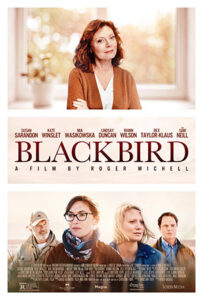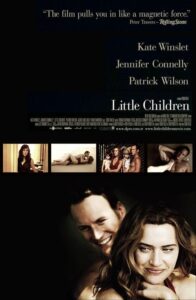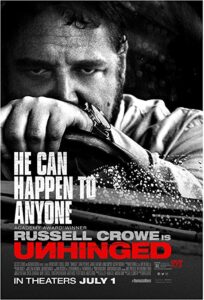 In my two most recent reviews (Little Children, Ammonite), I sang the praises of Kate Winslet, calling her the world’s most talented movie actress over the last 25 years (1995-2020). With seven (soon to be eight with Ammonite) Oscar nominations, only Meryl Streep (11) has more during that time. I almost ventured to say that she hadn’t taken on the wrong role then, but then I remembered that she lent herself to the Divergent series, which I do not fault. Though a movie such as Divergent does not need an actress of Winslet’s caliber to be successful, it is an opportunity to earn a lucrative payday. As a result, this allows her to take on roles in more independent projects. With that said, I may have jumped the gun a little in my reviews of Little Children and Ammonite. I was unaware that Roger Michell’s (My Cousin Rachel, Changing Lanes) melodramatic Blackbird would soon water down her stellar filmography.
In my two most recent reviews (Little Children, Ammonite), I sang the praises of Kate Winslet, calling her the world’s most talented movie actress over the last 25 years (1995-2020). With seven (soon to be eight with Ammonite) Oscar nominations, only Meryl Streep (11) has more during that time. I almost ventured to say that she hadn’t taken on the wrong role then, but then I remembered that she lent herself to the Divergent series, which I do not fault. Though a movie such as Divergent does not need an actress of Winslet’s caliber to be successful, it is an opportunity to earn a lucrative payday. As a result, this allows her to take on roles in more independent projects. With that said, I may have jumped the gun a little in my reviews of Little Children and Ammonite. I was unaware that Roger Michell’s (My Cousin Rachel, Changing Lanes) melodramatic Blackbird would soon water down her stellar filmography.
Little Children (2006)
 Little Children is a somewhat misleading name for a movie that doesn’t have much to do with children or anyone physically small. While a couple of kids are in this movie, they are non-descript and serve as props more than anything else. The leads are all middle-aged adults, though their undisciplined and erratic behavior suggests they are anything but. The protagonists act as entitled brats, while the antagonists are fundamentally flawed. It becomes apparent that we are on a collision course between all involved in a film whose setting is present-day New England, but that very well could be in any town in America.
Little Children is a somewhat misleading name for a movie that doesn’t have much to do with children or anyone physically small. While a couple of kids are in this movie, they are non-descript and serve as props more than anything else. The leads are all middle-aged adults, though their undisciplined and erratic behavior suggests they are anything but. The protagonists act as entitled brats, while the antagonists are fundamentally flawed. It becomes apparent that we are on a collision course between all involved in a film whose setting is present-day New England, but that very well could be in any town in America.
Ammonite (2020)
 Ammonite, Francis Lee’s (God’s Own Country) tells the familiar of something uniting us all: the internal need to find human connection, even when we externally live a life that suggests otherwise. We often seek out other humans to fulfill some of our needs inside of us, though we often have different capacities. As I write this review during the Coronavirus pandemic, this innate truth could not be more evident. The main difference between now and the past is that we can connect with others through face-to-face video technology, phone calls, text messages, email, social media, and other platforms. But in 1840 Europe (the time and setting of Ammonite), the person had to be physically near you, outside of the occasional letter that might or may not arrive in the mail. There certainly is real-time interaction if you and the other person are in the exact location. Our connections also aren’t authentic, and we live a fabricated existence because it beats being alone. So when we can connect with someone (on whatever mutually agreed upon level), it quickly becomes something we don’t want to let go of. And that is essentially the story of Ammonite.
Ammonite, Francis Lee’s (God’s Own Country) tells the familiar of something uniting us all: the internal need to find human connection, even when we externally live a life that suggests otherwise. We often seek out other humans to fulfill some of our needs inside of us, though we often have different capacities. As I write this review during the Coronavirus pandemic, this innate truth could not be more evident. The main difference between now and the past is that we can connect with others through face-to-face video technology, phone calls, text messages, email, social media, and other platforms. But in 1840 Europe (the time and setting of Ammonite), the person had to be physically near you, outside of the occasional letter that might or may not arrive in the mail. There certainly is real-time interaction if you and the other person are in the exact location. Our connections also aren’t authentic, and we live a fabricated existence because it beats being alone. So when we can connect with someone (on whatever mutually agreed upon level), it quickly becomes something we don’t want to let go of. And that is essentially the story of Ammonite.
The Cider House Rules (1999)
 The best part of The Cider House Rules, the 1999 film by director Lasse Hallström (An Unfinished Life, Chocolat), is the sweet, uplifting score from composer Rachel Portman. When a movie’s score is the best thing you can say about it, that’s not always good. With that said, some excellent movie scores out there help make a good movie great or a great film near perfect. Examples off the top of my head that I can think of are Jaws, Rocky, Sicario, Jurassic Park, The Last of the Mohicans, Drive, The Social Network, Halloween, Far and Away, The Empire Strikes Back, and Braveheart, to name a few. Each is a movie that I would consider to be, at worst, a B+ movie. Though a lesser score would likely not diminish my impression of any of these films, one of the first three or four things that come to mind is the score. When I think of The Cider House Rules, I think immediately of Portman’s beautiful Oscar-nominated score. However, unlike the movies above, its great score doesn’t equate to greatness. An A+ score probably takes this C+/B- movie up to a B.
The best part of The Cider House Rules, the 1999 film by director Lasse Hallström (An Unfinished Life, Chocolat), is the sweet, uplifting score from composer Rachel Portman. When a movie’s score is the best thing you can say about it, that’s not always good. With that said, some excellent movie scores out there help make a good movie great or a great film near perfect. Examples off the top of my head that I can think of are Jaws, Rocky, Sicario, Jurassic Park, The Last of the Mohicans, Drive, The Social Network, Halloween, Far and Away, The Empire Strikes Back, and Braveheart, to name a few. Each is a movie that I would consider to be, at worst, a B+ movie. Though a lesser score would likely not diminish my impression of any of these films, one of the first three or four things that come to mind is the score. When I think of The Cider House Rules, I think immediately of Portman’s beautiful Oscar-nominated score. However, unlike the movies above, its great score doesn’t equate to greatness. An A+ score probably takes this C+/B- movie up to a B.
Unhinged (2020)
 Deranged. Aggressive. Exorbitant. Implausible. Unhinged. Riveting. Adrenaline pumping. Wildly entertaining. Worthwhile Unhinged. Many adjectives describe Russell Crowe’s (Boy Erased, A Beautiful Mind), although words that would not be included would be well-crafted, consistent, or coherent. It’s a diverting 90-minute escape from the cruel reality of 2020, and it’s for that reason alone that I recommend it more than I would during a typical year. Starting with the film’s first scene, director Derrick Borte (American Dreamer, London Town) shows you the world he’s created around his leading character while setting the mood for what will be a relentless ride.
Deranged. Aggressive. Exorbitant. Implausible. Unhinged. Riveting. Adrenaline pumping. Wildly entertaining. Worthwhile Unhinged. Many adjectives describe Russell Crowe’s (Boy Erased, A Beautiful Mind), although words that would not be included would be well-crafted, consistent, or coherent. It’s a diverting 90-minute escape from the cruel reality of 2020, and it’s for that reason alone that I recommend it more than I would during a typical year. Starting with the film’s first scene, director Derrick Borte (American Dreamer, London Town) shows you the world he’s created around his leading character while setting the mood for what will be a relentless ride.